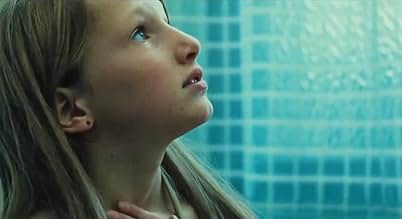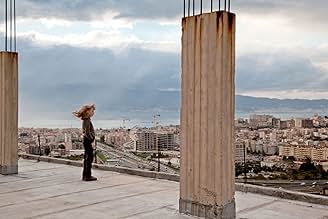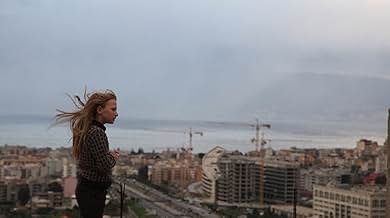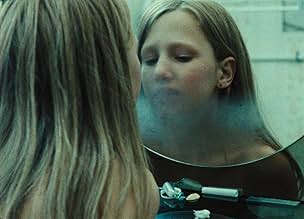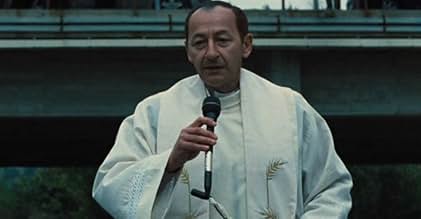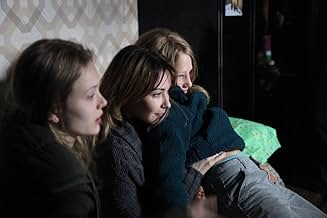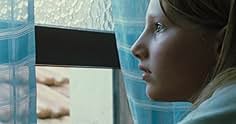CALIFICACIÓN DE IMDb
6.8/10
2.3 k
TU CALIFICACIÓN
Marta, de trece años, se ha mudado recientemente al sur de Italia con su madre y su hermana mayor y lucha por encontrar su lugar, probando sin descanso los límites de una ciudad desconocida ... Leer todoMarta, de trece años, se ha mudado recientemente al sur de Italia con su madre y su hermana mayor y lucha por encontrar su lugar, probando sin descanso los límites de una ciudad desconocida y el catecismo de la iglesia católica.Marta, de trece años, se ha mudado recientemente al sur de Italia con su madre y su hermana mayor y lucha por encontrar su lugar, probando sin descanso los límites de una ciudad desconocida y el catecismo de la iglesia católica.
- Dirección
- Guionista
- Elenco
- Premios
- 10 premios ganados y 10 nominaciones en total
Yile Yara Vianello
- Marta Ventura
- (as Yle Vianello)
Giovanni Federico
- Nino
- (as Gianni Federico)
Monia Alfieri
- Donatella
- (as Monica Alfieri)
- Dirección
- Guionista
- Todo el elenco y el equipo
- Producción, taquilla y más en IMDbPro
Opiniones destacadas
I finally caught up with Alice Rohrwacher's filmography and watched her debut feature, «Corpo celeste», made nine years ago and for which she won several awards as new director and for best first film. Since then, we have seen a talented filmmaker who is maturing with outstanding works, as «Le meraviglie»" (story of a family that owns an apiary) and «Lazzaro felice» (portrait of an immensely good-natured young man).
This is a subtle drama about growing up and enlightenment, about Marta (Yile Yara Vianello), a beautiful and sensitive girl who becomes a nubile adolescent, during the summer when she is going to receive the sacrament of confirmation in the Catholic church. Marta has just arrived from Switzerland to Reggio di Calabria, an Italian city controlled by the mafia, and she does not find it easy to fit into a small-town congregation of sanctimonious men and women with apocalyptic hearts, a bit silly peers and Don Mario, the parish priest who leads a double life: it is election time and he is seeking a promotion in the ecclesiastical hierarchy. To round things up, add Santa, his housekeeper and Sunday school teacher, who secretly loves him; and, on the personal side, Marta's family picture, made up of a single mother and three daughters, which Rohrwacher portrays as a vivid, volatile and affectionate nest.
Spaces and environments are always special in Rohrwacher's films and, besides her documentaries, here is a seed: we have seen many rugged European villages, carved out of mountains, between ascending curves, with rustic houses crowded one on top of the other, but the brief scenes in which the director's camera enters a house and a church in ruins, it is enough to reveal the desolation of the place; and, in the end, the film opens up (not closes, for it is not a "denouement", the film does not "untie plot knots", but fluently runs through emotions, situations and demonstrations) when Marta unexpectedly arrives to the sea, which, in the characters' fantasies, is alluded as a place of escape and repose.
A very good film, «Corpo celeste» is a preview of Alice Rohrwacher's next two major works, which I hope is enjoyed by those persons who love good cinema from all over the world.
This is a subtle drama about growing up and enlightenment, about Marta (Yile Yara Vianello), a beautiful and sensitive girl who becomes a nubile adolescent, during the summer when she is going to receive the sacrament of confirmation in the Catholic church. Marta has just arrived from Switzerland to Reggio di Calabria, an Italian city controlled by the mafia, and she does not find it easy to fit into a small-town congregation of sanctimonious men and women with apocalyptic hearts, a bit silly peers and Don Mario, the parish priest who leads a double life: it is election time and he is seeking a promotion in the ecclesiastical hierarchy. To round things up, add Santa, his housekeeper and Sunday school teacher, who secretly loves him; and, on the personal side, Marta's family picture, made up of a single mother and three daughters, which Rohrwacher portrays as a vivid, volatile and affectionate nest.
Spaces and environments are always special in Rohrwacher's films and, besides her documentaries, here is a seed: we have seen many rugged European villages, carved out of mountains, between ascending curves, with rustic houses crowded one on top of the other, but the brief scenes in which the director's camera enters a house and a church in ruins, it is enough to reveal the desolation of the place; and, in the end, the film opens up (not closes, for it is not a "denouement", the film does not "untie plot knots", but fluently runs through emotions, situations and demonstrations) when Marta unexpectedly arrives to the sea, which, in the characters' fantasies, is alluded as a place of escape and repose.
A very good film, «Corpo celeste» is a preview of Alice Rohrwacher's next two major works, which I hope is enjoyed by those persons who love good cinema from all over the world.
As anyone who has seen "The Wonders" or "Happy as Lazzaro" will know Alice Rohrwacher is one of the marvels of contemporary cinema. "Corpo Celeste" is her lesser-known, but no less astonishing, debut made with an almost documentary realism as we get to know the world through the eyes of 13 year old Marta as she comes to terms with growing up. Unlike other girls her age, however, Marta is subjected to perhaps a little more religious education than is usual as she prepares for her confirmation. This is Catholic Italy, after all.
Like Lazzaro, Marta is possessed of an innocence that is almost other-worldly. She might like to wear her big sister's bra but she's also remarkably childlike; Rohrwacher does innocence like no-one else. She also imbues her film with a nice sense of humour, even bordering on the cynical, (the priest whose ringtone on his mobile is 'The Minute Waltz' is both ambitious and something of a prig and is magnificently played by the late Salvatore Cantalupo). Indeed, Rohrwacher draws wonderfully naturalistic performances from her entire cast and in particular from Yie Vianello as Marta. In fact, "Corpo Celeste" isn't just a superb debut but one of the best films about both childhood and religion I've ever seen. With only three features to her name, Rohrwacher may just be my favourite director right now.
Like Lazzaro, Marta is possessed of an innocence that is almost other-worldly. She might like to wear her big sister's bra but she's also remarkably childlike; Rohrwacher does innocence like no-one else. She also imbues her film with a nice sense of humour, even bordering on the cynical, (the priest whose ringtone on his mobile is 'The Minute Waltz' is both ambitious and something of a prig and is magnificently played by the late Salvatore Cantalupo). Indeed, Rohrwacher draws wonderfully naturalistic performances from her entire cast and in particular from Yie Vianello as Marta. In fact, "Corpo Celeste" isn't just a superb debut but one of the best films about both childhood and religion I've ever seen. With only three features to her name, Rohrwacher may just be my favourite director right now.
I'm grateful to finally find a film that is sensitive, subtle, original in its view of people and has something to say (about faith and the church, society and outsiders.) It's Italian, but only two characters act like the Italian angry prototype, and only briefly. The acting is extraordinary. Yle Vianello, who plays the thirteen years old girl, seems as authentic as it gets. It is her story-after ten years in Switzerland, she returns to a small town in Italy with her single mother and 18-year-old sister. Right away she's called to participate in the endless studies for the communion at church. She tries to fit in, but is swept by other types of emotional and spiritual searches.
While I loved the nuanced and sensitive performance of Yle Vianello as Marta, I couldn't help but feel that writer/director Alice Rohrwacher's portrayal of the Catholic church in Corpo Celeste was an overdrawn caricature – that only reinforced the usual stereotypes against institutional religion. In contrast, the almost intuitive spirituality Marta possesses – of gentleness towards others, wonder at creation, curiosity about the world + its people, reverence for the divine – those elements could have been connected to broad Christian doctrines of natural revelation, love for neighbor, and the work of the Spirit, but they were not. Though the ending makes Marta's journey beyond the film feel uncertain, somehow I'm convinced (if it is possible to extrapolate) that Marta will be ultimately alright in the end. She may not find truth in the unfortunate parish she finds herself in, but she's much closer to the Truth than almost everyone else in the film. We see this in the innocent delight over the kittens that she joyfully shares with her classmates. We see this in her desire to understand the phrase from her catechism recitation "Eli, Eli, Lama Sabachthani?" which she goes around repeating to herself without knowing the meaning. This forsaken uttering of Christ on the cross ironically rings quite true in Marta's life as she is mistreated by those in church leadership, cruelly bullied by her older sister, and witnesses powerlessly the brutal killing of the kittens. In spite of all the hypocrisy and vacuity of the parish, when Marta finds herself next to a huge dusty crucifix in a forsaken little village church, she instinctively uses her hands and shirt sleeve to gently and reverently wipe the dirt off the body of Christ. Somehow, in spite of it all, a real spirituality and an intimate relationship with Christ has been apprehended.
After a slow start, I really enjoyed this one. Yle Vianello is wonderful as Marta, the earnest young girl about to go through the rite of confirmation in the Catholic Church. In a quiet way and without resorting to something like a story of priestly abuse, director Alice Rohrwacher gives us a powerful critique. She shows church leaders to be almost hopelessly far from Christ's precepts, and more interested in indoctrinating the young (in some cases with untranslated and unexplained dogma) and their own positions within the hierarchy than in real teaching. The drive from Reggio Calabria to the abandoned hill town to tussle over a crucifix seems like a perfect metaphor. I felt for Marta's coming-of-age alienation from her changing body, her mean older sister, and her crisis of faith. The subplot of the priest's assistant, a woman who finds out just how little she means in the patriarchy of the church, is also strong.
Selecciones populares
Inicia sesión para calificar y agrega a la lista de videos para obtener recomendaciones personalizadas
- How long is Corpo Celeste?Con tecnología de Alexa
Detalles
- Fecha de lanzamiento
- Países de origen
- Sitios oficiales
- Idioma
- También se conoce como
- Corpo Celeste
- Locaciones de filmación
- Productoras
- Ver más créditos de la compañía en IMDbPro
Taquilla
- Total en EE. UU. y Canadá
- USD 8,919
- Fin de semana de estreno en EE. UU. y Canadá
- USD 2,263
- 10 jun 2012
- Total a nivel mundial
- USD 347,600
- Tiempo de ejecución1 hora 39 minutos
- Color
- Mezcla de sonido
- Relación de aspecto
- 1.85 : 1
Contribuir a esta página
Sugiere una edición o agrega el contenido que falta

Principales brechas de datos
What is the German language plot outline for Corpo celeste (2011)?
Responda

